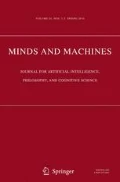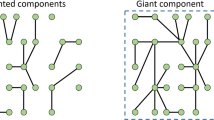Abstract
Individual rationality, or doing what is best for oneself, is a standard model used to explain and predict human behavior, and von Neumann–Morgenstern game theory is the classical mathematical formalization of this theory in multiple-agent settings. Individual rationality, however, is an inadequate model for the synthesis of artificial social systems where cooperation is essential, since it does not permit the accommodation of group interests other than as aggregations of individual interests. Satisficing game theory is based upon a well-defined notion of being good enough, and does accommodate group as well as individual interests through the use of conditional preference relationships, whereby a decision maker is able to adjust its preferences as a function of the preferences, and not just the options, of others. This new theory is offered as an alternative paradigm to construct artificial societies that are capable of complex behavior that goes beyond exclusive self interest.
Similar content being viewed by others
References
Arrow, K. J. (1951), Social Choice and Individual Values, 2nd ed., New York: John Wiley, 1963.
Arrow, K. J. (1986), ‘Rationality of Self and Others’, in R. M. Hogarth and M. W. Reder, eds., Rational Choice, Chicago, IL: University of Chicago Press.
Axelrod, R. (1984), The Evolution of Cooperation, New York: Basic Books.
Bergson, A. (1938), ‘A Reformulation of Certain Aspects of Welfare Economics’, Quarterly Journal of Economics 52, pp. 310–334.
Bicchieri, C. (1993), Rationality and Coordination, Cambridge: Cambridge University Press.
Bowling, M. (2000), ‘Convergence Problems of General-Sum Multiagent Reinforcement Learning’, in Proceedings of the Seventeenth International Conference on Machine Learning.
Cooper, R., DeJong, D. V., Forsythe, R. and Ross, T. W. (1996), ‘Cooperation Without Reputation: Experimental Evidence from Prisoner's Dilemma Games’, Games and Economic Behavior 12(1), pp. 187–218.
Eisen, M. (1969), Introduction to Mathematical Probability Theory, Englewood Cliffs, NJ: Prentice-Hall.
Fudenberg, D. and Levine, D. K. (1993), ‘Steady State Learning and Nash Equilibrium’, Econometrica 61(3), pp. 547–573.
Glass, A. and Grosz, B. (2000), ‘Socially Conscious Decision-Making’, in Proceedings of Agents 2000 Conference, Barcelona, Spain, pp. 217–224.
Goodrich, M. A., Stirling, W. C. and Boer, E. R. (2000), Satisficing Revisited, Minds and Machines 10, pp. 79–109.
Hu, J. and Wellman, M. P. (1998), ‘Multiagent Reinforcement Learning: Theoretical Framework and an Algorithm’, in J. Shavlik, ed., Proceedings of the Fifteenth International Conference on Machine Learning, pp. 242–250.
Kalai, E. and Lehrer, E. (1993), ‘Rational Learning Leads to Nash Equilibrium’, Econometrica, 61(5), pp. 1019–1045.
Kreps, D. M. (1990), Game Theory and Economic Modelling, Oxford: Clarendon Press.
Lewis, D. K. (1969), Convention, Cambridge, MA: Harvard University Press.
Luce, R. D. and Raiffa, H. (1957), Games and Decisions, New York: John Wiley.
Palmer, F. R. (1971), Grammar, Harmondsworth, Middlesex: Penguin.
Peirce, C. S. (1877), ‘The Fixation of Belief’, Popular Science Monthly 12.
Raiffa, H. (1968), Decision Analysis, Reading, MA: Addison-Wesley.
Rapoport, A. (1970), N-Person Game Theory, Ann Arbor, MI: The University of Michigan Press.
Samuelson, P. A. (1948), Foundations of Economic Analysis, Cambridge, MA: Harvard University Press.
Sandhlom, T.W. (1999), ‘Distributed Rational Decision Making’, in G. Weiss, ed., Multiagent Systems, chapter 5, Cambridge, MA: MIT Press, pp. 201–258.
Sargent, T. J. (1993), Bounded Rationality in Macroeconomics, Oxford: Oxford University Press.
Schelling, T. C. (1960), The Strategy of Conflict, Oxford: Oxford University Press.
Sen, S. (1996), ‘Reciprocity: A Foundational Principle for Promoting Cooperative Behavior Among Self-interested Agents’, in Proceedings of The Second International Conference on Multi-Agent Systems, Kyoto, Japan, pp. 322–329.
Shapley, L. S. (1953), ‘A Value for m-Person Games’, in H. W. Kuhn and A. W. Tucker, eds., Contributions to the Theory of Games, Princeton, NJ: Princeton University Press.
Shubik, M. (1982), Game Theory in the Social Sciences, Cambridge, MA: MIT Press.
Simon, H. A. (1955), ‘A Behavioral Model of Rational Choice’, Quart. J. Econ. 59, pp. 99–118.
Sims, C. (1980), ‘Macroeconomics and Reality’, Econmetrica 69, pp. 1–48.
Stirling, W. C. and Goodrich, M. A. (1999a), ‘Satisficing Equilibria: A Non-Classical Approach to Games and Decisions’, in S. Parsons and M. J. Woolridge, eds., Workshop on Decision Theoretic and Game Theoretic Agents, London, University College London, 5 July, pp. 56–70.
Stirling, W. C. and Goodrich, M. A. (1999b), ‘Satisficing Games’, Information Sciences 114, pp. 255–280.
von Neumann, J. and Morgenstern, O. (1944), The Theory of Games and Economic Behavior, Princeton, NJ: Princeton University Press, (2nd ed., 1947).
Wolpert, D. H. and Turner, K. (2001), ‘Reinforcement Learning in Distributed Domains: An Inverse Game Theoretic Approach’, in Proceedings of the 2001 AAAI Symposium: Game Theoretic and Decision Theoretic Agents, 26–28 March, Stanford California. Technical Report SS-01-03, pp. 126–133.
Author information
Authors and Affiliations
Rights and permissions
About this article
Cite this article
Stirling, W.C. Games Machines Play. Minds and Machines 12, 327–352 (2002). https://doi.org/10.1023/A:1016163920892
Issue Date:
DOI: https://doi.org/10.1023/A:1016163920892




